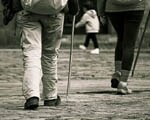Seniors who are more socially active are less likely to become disabled.

To test the hypothesis that a higher level of social activity is associated with lower risk of disability in older adults, researchers studied 954 elderly Americans with an average age of 82 years, who had no disability at the start of the study period. The participants underwent yearly physical and mental evaluations and provided information about their social activities, such as going out to eat, playing bingo, doing volunteer work, taking day or overnight trips, and participating in community groups.
It was found that compared to people with low levels of social activity, those who had high levels of social activity were about twice as likely to remain free of disabilities that hindered activities of daily living (such as feeding, bathing, dressing, using the toilet) and about 1.5 times more likely to remain free of disabilities that affected mobility or instrumental activities of daily living (for example, using the telephone, preparing meals and managing medications).
Social activity has long been recognised as an essential component of healthy aging, but the above findings suggest that it is also related to better everyday functioning and less disability in old age.
It's not clear how social activity helps prevent disability, but it may reinforce the neural networks and musculoskeletal function required to maintain physical function.
DoctorNDTV is the one stop site for all your health needs providing the most credible health information, health news and tips with expert advice on healthy living, diet plans, informative videos etc. You can get the most relevant and accurate info you need about health problems like diabetes, cancer, pregnancy, HIV and AIDS, weight loss and many other lifestyle diseases. We have a panel of over 350 experts who help us develop content by giving their valuable inputs and bringing to us the latest in the world of healthcare.












